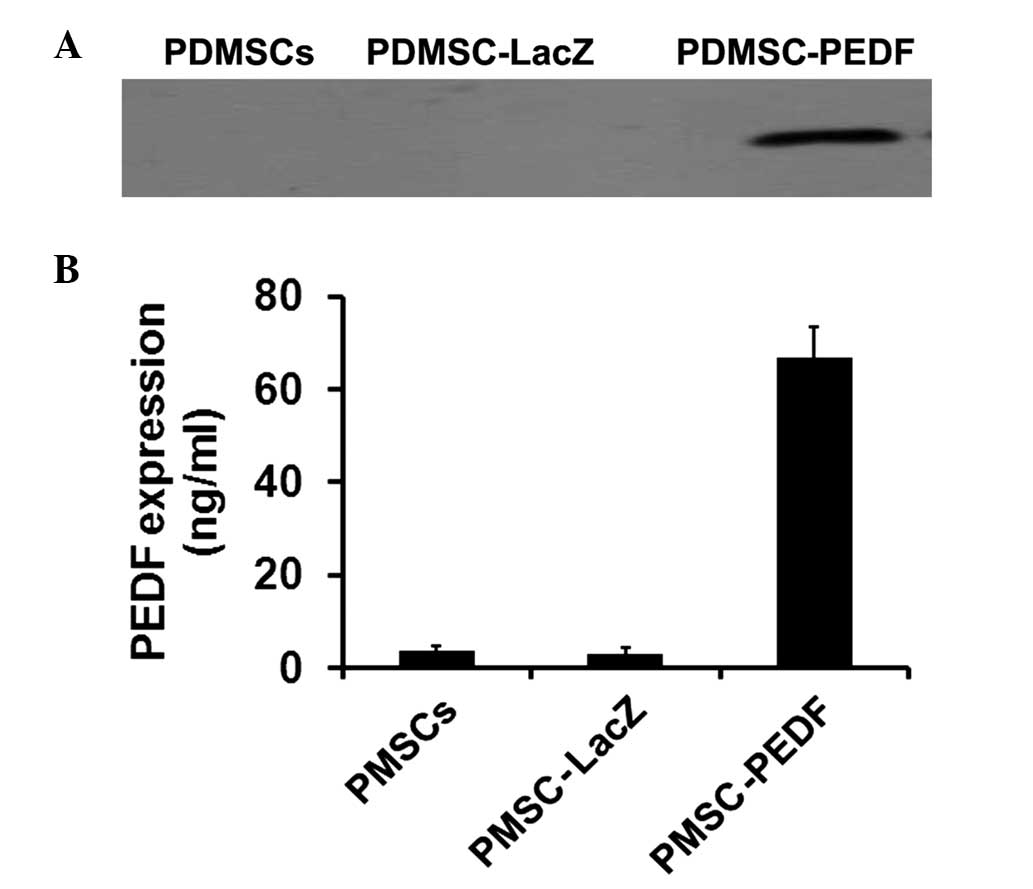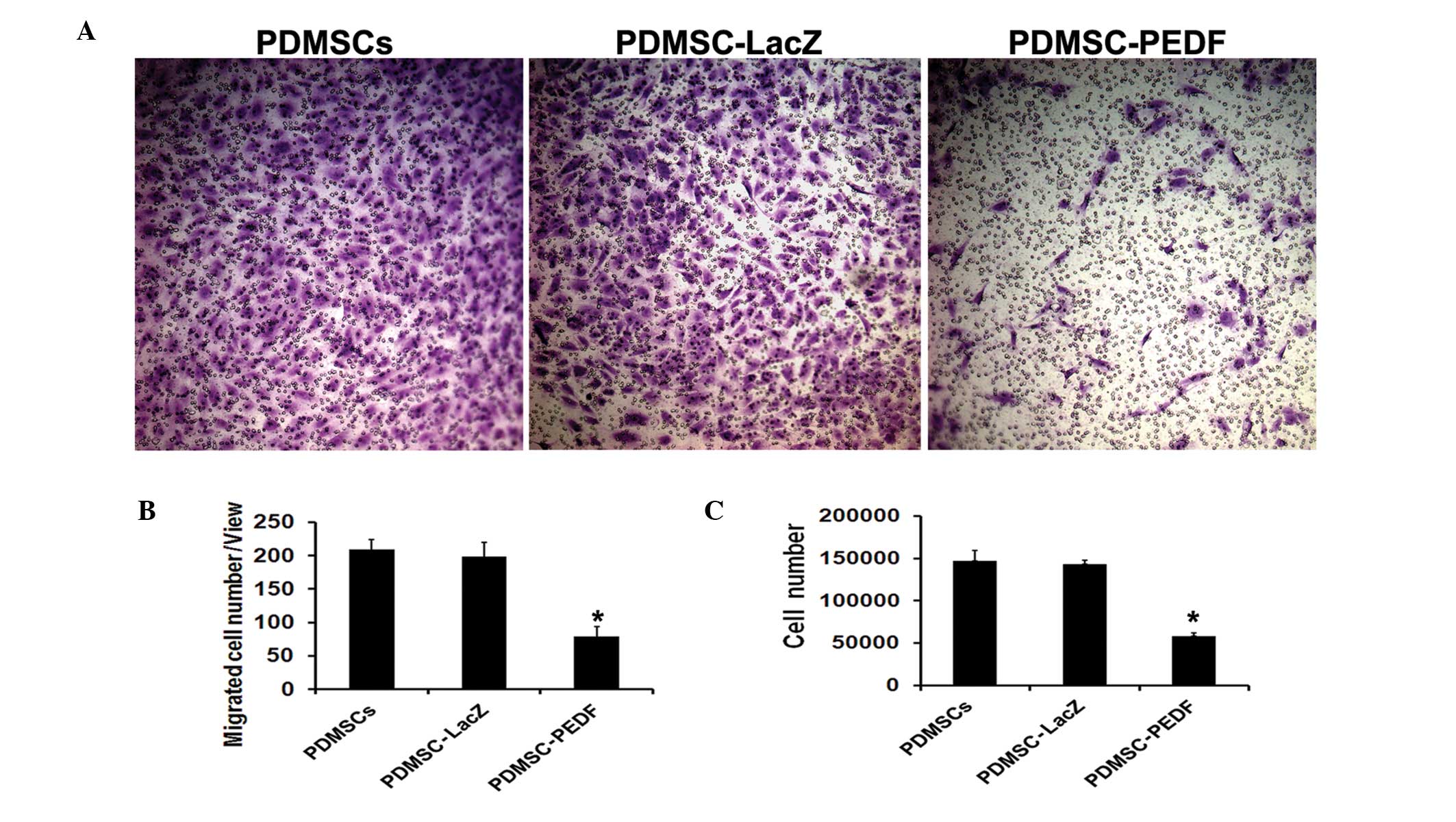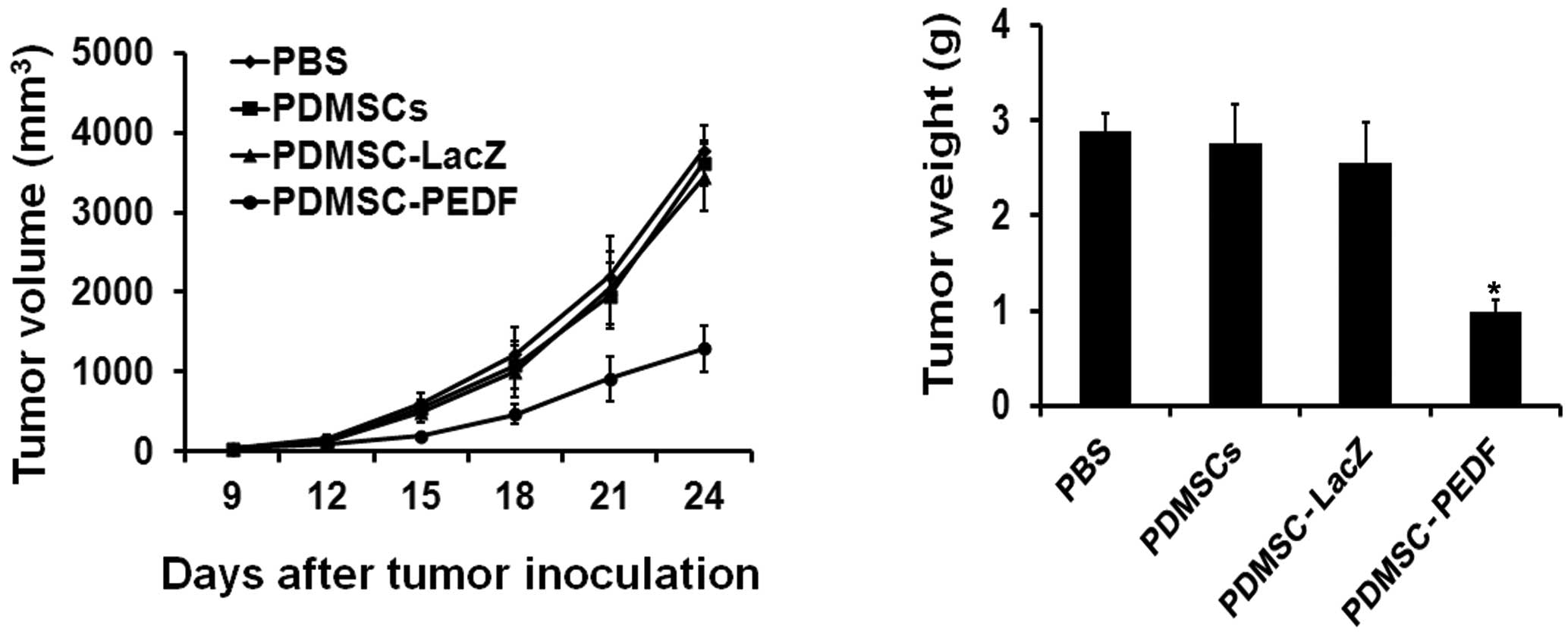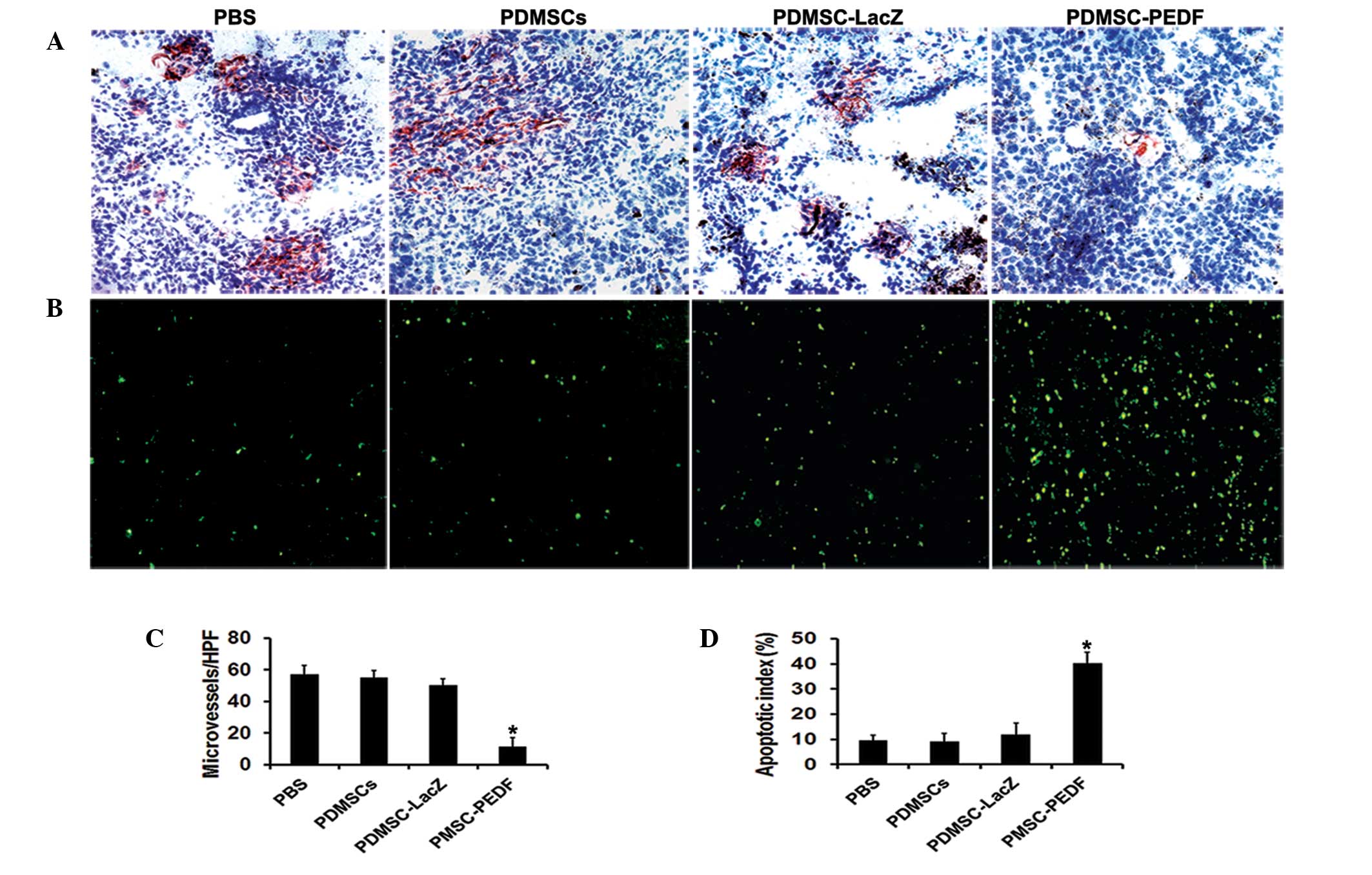|
1
|
Soengas MS and Lowe SW: Apoptosis and
melanoma chemoresistance. Oncogene. 22:3138–3151. 2003. View Article : Google Scholar : PubMed/NCBI
|
|
2
|
Rook G: Tumours and Coley's toxins.
Nature. 357:5451992. View
Article : Google Scholar
|
|
3
|
Dass CR, Tran TM and Choong PF:
Angiogenesis inhibitors and the need for anti-angiogenic
therapeutics. J Dent Res. 86:927–936. 2007. View Article : Google Scholar : PubMed/NCBI
|
|
4
|
Dawson DW, Volpert OV, Gillis P, et al:
Pigment epithelium-derived factor: a potent inhibitor of
angiogenesis. Science. 285:245–248. 1999. View Article : Google Scholar : PubMed/NCBI
|
|
5
|
Elayappan B, Ravinarayannan H, Pasha SP,
Lee KJ and Gurunathan S: PEDF inhibits VEGF- and EPO- induced
angiogenesis in retinal endothelial cells through interruption of
PI3K/Akt phosphorylation. Angiogenesis. 12:313–324. 2009.
View Article : Google Scholar
|
|
6
|
Doll JA, Stellmach VM, Bouck NP, et al:
Pigment epithelium-derived factor regulates the vasculature and
mass of the prostate and pancreas. Nat Med. 9:774–780. 2003.
View Article : Google Scholar : PubMed/NCBI
|
|
7
|
Yang LP, Cheng P, Peng XC, et al:
Anti-tumor effect of adenovirus-mediated gene transfer of pigment
epithelium-derived factor on mouse B16-F10 melanoma. J Exp Clin
Cancer Res. 28:752009. View Article : Google Scholar : PubMed/NCBI
|
|
8
|
Fritz V and Jorgensen C: Mesenchymal stem
cells: an emerging tool for cancer targeting and therapy. Curr Stem
Cell Res Ther. 3:32–42. 2008. View Article : Google Scholar : PubMed/NCBI
|
|
9
|
Rao MS and Mattson MP: Stem cells and
aging: expanding the possibilities. Mech Ageing Dev. 122:713–734.
2001. View Article : Google Scholar : PubMed/NCBI
|
|
10
|
Pasquinelli G, Tazzari P, Ricci F, et al:
Ultrastructural characteristics of human mesenchymal stromal (stem)
cells derived from bone marrow and term placenta. Ultrastruct
Pathol. 31:23–31. 2007. View Article : Google Scholar : PubMed/NCBI
|
|
11
|
Rus Ciuca D, Soritau O, Susman S, Pop VI
and Mihu CM: Isolation and characterization of chorionic mesenchyal
stem cells from the placenta. Rom J Morphol Embryol. 52:803–808.
2011.PubMed/NCBI
|
|
12
|
In 't Anker PS, Scherjon SA, Kleijburg-van
der Keur C, et al: Isolation of mesenchymal stem cells of fetal or
maternal origin from human placenta. Stem Cells. 22:1338–1345.
2004.
|
|
13
|
Kadam S, Muthyala S, Nair P and Bhonde R:
Human placenta-derived mesenchymal stem cells and islet-like cell
clusters generated from these cells as a novel source for stem cell
therapy in diabetes. Rev Diabet Stud. 7:168–182. 2010.PubMed/NCBI
|
|
14
|
Mihu CM, Mihu D, Costin N, Rus Ciuca D,
Susman S and Ciortea R: Isolation and characterization of stem
cells from the placenta and the umbilical cord. Rom J Morphol
Embryol. 49:441–446. 2008.PubMed/NCBI
|
|
15
|
Chang CJ, Yen ML, Chen YC, et al:
Placenta-derived multipotent cells exhibit immunosuppressive
properties that are enhanced in the presence of interferon-gamma.
Stem Cells. 24:2466–2477. 2006. View Article : Google Scholar
|
|
16
|
Jaffe EA, Nachman RL, Becker CG and Minick
CR: Culture of human endothelial cells derived from umbilical
veins. Identification by morphologic and immunologic criteria. J
Clin Invest. 52:2745–2756. 1973. View Article : Google Scholar : PubMed/NCBI
|
|
17
|
Liu JY, Wei YQ, Yang L, et al:
Immunotherapy of tumors with vaccine based on quail homologous
vascular endothelial growth factor receptor-2. Blood.
102:1815–1823. 2003. View Article : Google Scholar : PubMed/NCBI
|
|
18
|
Cao G, O'Brien CD, Zhou Z, et al:
Involvement of human PECAM-1 in angiogenesis and in vitro
endothelial cell migration. Am J Physiol Cell Physiol.
282:C1181–C1190. 2002. View Article : Google Scholar : PubMed/NCBI
|
|
19
|
Zhang S, Cao Z, Tian H, et al: SKLB1002, a
novel potent inhibitor of VEGF receptor 2 signaling, inhibits
angiogenesis and tumor growth in vivo. Clin Cancer Res.
17:4439–4450. 2011. View Article : Google Scholar : PubMed/NCBI
|
|
20
|
Hu M, Yang JL, Teng H, et al:
Anti-angiogenesis therapy based on the bone marrow-derived stromal
cells genetically engineered to express sFlt-1 in mouse tumor
model. BMC Cancer. 8:3062008. View Article : Google Scholar : PubMed/NCBI
|
|
21
|
Wang L, Schmitz V, Perez-Mediavilla A,
Izal I, Prieto J and Qian C: Suppression of angiogenesis and tumor
growth by adenoviral-mediated gene transfer of pigment
epithelium-derived factor. Mol Ther. 8:72–79. 2003. View Article : Google Scholar : PubMed/NCBI
|
|
22
|
Peng XC, Yang L, Yang LP, et al: Efficient
inhibition of murine breast cancer growth and metastasis by gene
transferred mouse survivin Thr34-->Ala mutant. J Exp Clin Cancer
Res. 27:462008. View Article : Google Scholar : PubMed/NCBI
|
|
23
|
North S, Moenner M and Bikfalvi A: Recent
developments in the regulation of the angiogenic switch by cellular
stress factors in tumors. Cancer Lett. 218:1–14. 2005. View Article : Google Scholar : PubMed/NCBI
|
|
24
|
Emmett MS, Dewing D and Pritchard-Jones
RO: Angiogenesis and melanoma - from basic science to clinical
trials. Am J Cancer Res. 1:852–868. 2011.PubMed/NCBI
|
|
25
|
Ek ET, Dass CR and Choong PF: Pigment
epithelium-derived factor: a multimodal tumor inhibitor. Mol Cancer
Ther. 5:1641–1646. 2006. View Article : Google Scholar : PubMed/NCBI
|
|
26
|
Garcia M, Fernandez-Garcia NI, Rivas V, et
al: Inhibition of xenografted human melanoma growth and prevention
of metastasis development by dual antiangiogenic/antitumor
activities of pigment epithelium-derived factor. Cancer Res.
64:5632–5642. 2004. View Article : Google Scholar
|
|
27
|
Abe R, Shimizu T, Yamagishi S, et al:
Overexpression of pigment epithelium-derived factor decreases
angiogenesis and inhibits the growth of human malignant melanoma
cells in vivo. Am J Pathol. 164:1225–1232. 2004. View Article : Google Scholar
|
|
28
|
Evangelista M, Soncini M and Parolini O:
Placenta-derived stem cells: new hope for cell therapy?
Cytotechnology. 58:33–42. 2008. View Article : Google Scholar : PubMed/NCBI
|
|
29
|
Parolini O, Alviano F, Bagnara GP, et al:
Concise review: isolation and characterization of cells from human
term placenta: outcome of the first international Workshop on
Placenta Derived Stem Cells. Stem Cells. 26:300–311. 2008.
View Article : Google Scholar : PubMed/NCBI
|
|
30
|
Wagner JE, Rosenthal J, Sweetman R, et al:
Successful transplantation of HLA-matched and HLA-mismatched
umbilical cord blood from unrelated donors: analysis of engraftment
and acute graft-versus-host disease. Blood. 88:795–802.
1996.PubMed/NCBI
|
|
31
|
Bailo M, Soncini M, Vertua E, et al:
Engraftment potential of human amnion and chorion cells derived
from term placenta. Transplantation. 78:1439–1448. 2004. View Article : Google Scholar : PubMed/NCBI
|
|
32
|
Meng XT, Li C, Dong ZY, et al:
Co-transplantation of bFGF-expressing amniotic epithelial cells and
neural stem cells promotes functional recovery in spinal
cord-injured rats. Cell Biol Int. 32:1546–1558. 2008. View Article : Google Scholar : PubMed/NCBI
|
|
33
|
Sankar V and Muthusamy R: Role of human
amniotic epithelial cell transplantation in spinal cord injury
repair research. Neuroscience. 118:11–17. 2003. View Article : Google Scholar : PubMed/NCBI
|


















